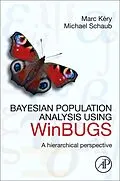Bayesian statistics has exploded into biology and its sub-disciplines, such as ecology, over the past decade. The free software program WinBUGS, and its open-source sister OpenBugs, is currently the only flexible and general-purpose program available with which the average ecologist can conduct standard and non-standard Bayesian statistics. - Comprehensive and richly commented examples illustrate a wide range of models that are most relevant to the research of a modern population ecologist - All WinBUGS/OpenBUGS analyses are completely integrated in software R - Includes complete documentation of all R and WinBUGS code required to conduct analyses and shows all the necessary steps from having the data in a text file out of Excel to interpreting and processing the output from WinBUGS in R
Autorentext
Marc Kéry is a population ecologist with the Swiss Ornithological Institute and a courtesy professor at the University of Zürich. He is an expert in the estimation and modeling of abundance, distribution and species richness in animal and plant populations and has coauthored approximately 100 peer-reviewed articles and four books.
Inhalt
1. Introduction
2. Very brief introduction to Bayesian statistical modeling
3. Introduction to the generalized linear model (GLM): The simplest model for count data
4. Introduction to random effects: The conventional Poisson GLMM for count data
5. State-space models
6. Estimation of population size
7. Estimation of survival probabilities using capture-recapture data
8. Estimation of survival probabilities using mark-recovery data
9. Multistate capture-recapture models
10. Estimation of survival and recruitment using the Jolly-Seber model
11. Integrated population models
12. Metapopulation modeling of abundance using hierarchical Poisson regression
13. Metapopulation modeling of species distributions using hierarchical logistic regression
14. Concluding remarks
